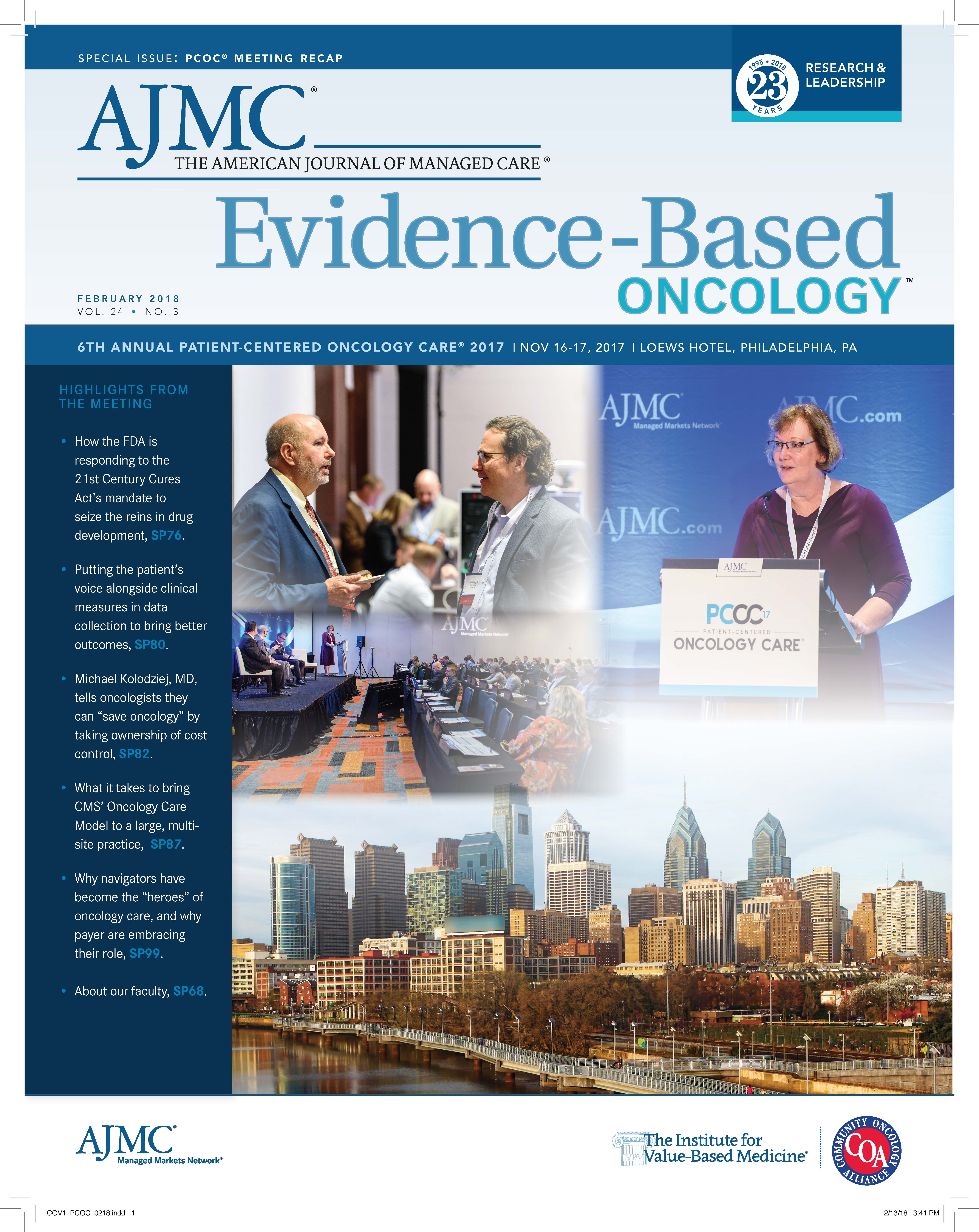- Center on Health Equity & Access
- Clinical
- Health Care Cost
- Health Care Delivery
- Insurance
- Policy
- Technology
- Value-Based Care
Adopting Real-World Evidence and Value Into a Payment Model
Coverage of value updates from Patient-Centered Oncology Care, November 16-17, 2018.
Does real-world evidence have a place in increasing the value of care? A panel took on that question during a discussion on the second day of Patient-Centered Oncology Care® in Philadelphia, Pennsylvania. The meeting was presented November 16-17, 2017, by The American Journal of Managed Care®.
The panel included Lalan Wilfong, MD, oncologist at Texas Oncology; Ian Manners, MBA, founder and CEO of Vivor; and Jason Harris, manager of public policy at the National Health Council (NHC), who discussed the role of real-world evidence in the healthcare field.
Harris said the NHC pursues patient engagement both directly and indirectly. The council speaks with patient groups to learn their priorities, but it also has the capacity to draw data from patient registries to learn what learn what patients value. This data can then be used by payers or the FDA to improve overall value for patients.
Wilfong noted that his team is focusing on improving the patient experience, specifically when calling a doctor’s office, through the information gathered from patient satisfaction surveys. He also said that his organization is working to hold other organizations and individual sites within Texas Oncology, which is a multisite practice, accountable for change management and increased engagement at a local level.
Additionally, Wilfong described the challenges involving patient decisions that call for balancing financial considerations without limiting what is needed for good care. “They don’t want to fully engage us in those conversations because they’re afraid that we will limit their care if we realize how financially struggling it is for them,” Wilfong said. “Many times, we don’t realize that, as providers, until it’s too late, until you see not just the patient but the family struggling to make ends meet. And that’s a problem. No matter how you have those conversations, there’s still a disconnect between us and the patient about those needs.”
Manners’ software company Vivor acts as a financial platform that helps providers find resources that are underused for patients, like assistance from pharmaceutical companies or nonprofit foundations. The company finds solutions for providers to help their patients afford treatments, Manners explained. He emphasized that it is part of a provider’s responsibility to consider the patient’s financial experience.
Manners also discussed a trial that Vivor is conducting to see if providing patients with financial resource information at the point-of-care would reduce out-of-pocket (OOP) costs. “[At] least they can start there, explain what the patient’s out-of-pocket costs are going to be as they go through a treatment plan, and then bring up the other issues, [such as, ‘How is this going to affect your work? Is it going to change the insurance that you can afford?’” Manners noted.
The panelists agreed that when it comes to cancer treatment, most individuals are willing to spend whatever it takes for the best treatment and doctors, but according to Wilfong, their ability to make a choice is eliminated. Furthermore, Harris emphasized the importance of accountability when considering the limited choices for cancer treatment, especially for those that are uninsured and underinsured.
“When it comes to looking for positive outcomes, health outcomes [come] first, of course, but when we say this pathway, this treatment plan, was the best one based on real-world evidence, we need to account for the patient’s financial experience as well,” explained Manners. “And we need to start doing that by first
collecting the data on it.”
In reference to the Oncology Care Model (OCM), Manners considers it to be vague and open to interpretation. He called for a more specific financial plan through the OCM that would help patients understand insurance benefits and OOP costs.
Overall, the panelists emphasized the importance of providing patients with the necessary resources and to work on minimizing the disconnect between physicians and patients, especially when it involves treatment costs.
“So, where we’re at right now is sometimes there’s a big disconnect between the different stakeholders and what that value means to that patient sitting in front of you,” Wilfong said. “Many payers are having their own pathways that may be discordant from our pathways for various reasons. And so, we’re having those discussions more.”

Building Trust: Public Priorities for Health Care AI Labeling
January 27th 2026A Michigan-based deliberative study found strong public support for patient-informed artificial intelligence (AI) labeling in health care, emphasizing transparency, privacy, equity, and safety to build trust.
Read More
Exploring Racial, Ethnic Disparities in Cancer Care Prior Authorization Decisions
October 24th 2024On this episode of Managed Care Cast, we're talking with the author of a study published in the October 2024 issue of The American Journal of Managed Care® that explored prior authorization decisions in cancer care by race and ethnicity for commercially insured patients.
Listen
Motivating and Enabling Factors Supporting Targeted Improvements to Hospital-SNF Transitions
January 26th 2026Skilled nursing facilities (SNFs) with a high volume of referred patients with Alzheimer disease and related dementias may work harder to manage care transitions with less availability of resources that enable high-quality handoffs.
Read More

